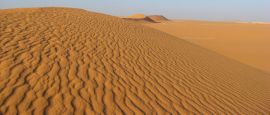Getting around Algeria
Air Algérie (www.airalgerie.dz) operates frequent services from Algiers domestic airport (adjacent to Algiers International) to the major business centres of Annaba, Constantine and Oran. Less frequent services run from Algiers, Oran, Constantine and Annaba to the other less important commercial centres and gateway oases such as Ghardaia (six hours from Algiers) and Ouargla, as well as important oil towns such as In Amenas and Hassi Messaoud.
Services are generally reliable, but air travel to the far south may be subject to delay during the dry summer months because of sandstorms. Despite this, air is by far the most practical means of transport to the far south for the visitor with limited resources of time; Djanet and Tamanrasset are the oasis gateways to the Tassili N'Ajjer and the Hoggar, respectively.
There is an Air Algérie office in every Algerian town which is served by the airline. You can arrange reservations and itineraries from these offices, but as some of the more isolated offices are not connected by computer or fax, you should confirm reservations well in advance. Offices are very busy in the major towns.
Driving in Algeria is not for the fainthearted. While driving conditions within the cities are of a reasonable standard, the standards of driving differ hugely, and the distances between cities are large. The N1 (a 1,200km/746-mile motorway) links major cities in the north, from east to west. Security checkpoints outside the major cities are a common sight.
Driving in the desert is not advised without thorough preparation beforehand. It will require a 4x4 and in some cases a permit. It's illegal to drive through the desert alone due to the threat of kidnap and terrorism in the Sahel region.
Road surfaces are reasonably good. All vehicles travelling in the desert should be in good mechanical condition, as breakdown facilities are virtually non-existent. Travellers must carry full supplies of water and petrol. Travel by road (outside Algiers) in northern Algeria should be avoided after dark.
You can arrange car hire at the airport on arrival or in most towns. Many hotels can also book this for you.
It's advised not to use public transport other than licensed taxis recommended by established hotels. All taxis are metered and are plentiful in most cities and major towns, though busy during the early evening in the main cities as many people use them to return home after work.
The habit of sharing a taxi is widespread – a shared taxi is called a louage. Be aware that there are surcharges after dark.
Cycling isn’t impossible in Algeria but with cycle hire practically non-existent and poor road conditions for cycling, it’s not an advisable way of getting around.
There is a long-distance bus network around Algeria, with fares and routes operating out of the major cities.
Drivers should be aware that drink-driving is illegal. Speed limits are up to 120kph (75mph) on motorways. Children under the age of 10 must sit in the rear of the car.
An International Driving Permit is required. A carnet de passage may be required. Cars are allowed entry for three months without duty. You must buy insurance at the border. Proof of ownership is essential.
Municipal bus and tram services operate in Algiers, its suburbs and the coastal area. You can buy 10-journey carnets and daily or weekly passes. There are also two public lifts and a funicular that lead up to the hill overlooking the old souk in Algiers. The capital also has a one-line metro system (more lines are planned) plus a modern tram line.
The Société Nationale des Transports Ferroviaires (SNTF) (www.sntf.dz) runs Algeria's railways. Daily (but fairly slow) services operate in the northern part of the country between Algiers and Oran, Béjaia, Skikda, Annaba and Constantine. The southern routes connect from Annaba to Tebessa via Souk Ahras, Constantine with Touggourt via Biskra and Mohammadia with Bechar.
Do you have any Feedback about this page?
© 2026 Columbus Travel Media Ltd. All rights reserved. No part of this site may be reproduced without our written permission, click here for information on Columbus Content Solutions.




 You know where
You know where